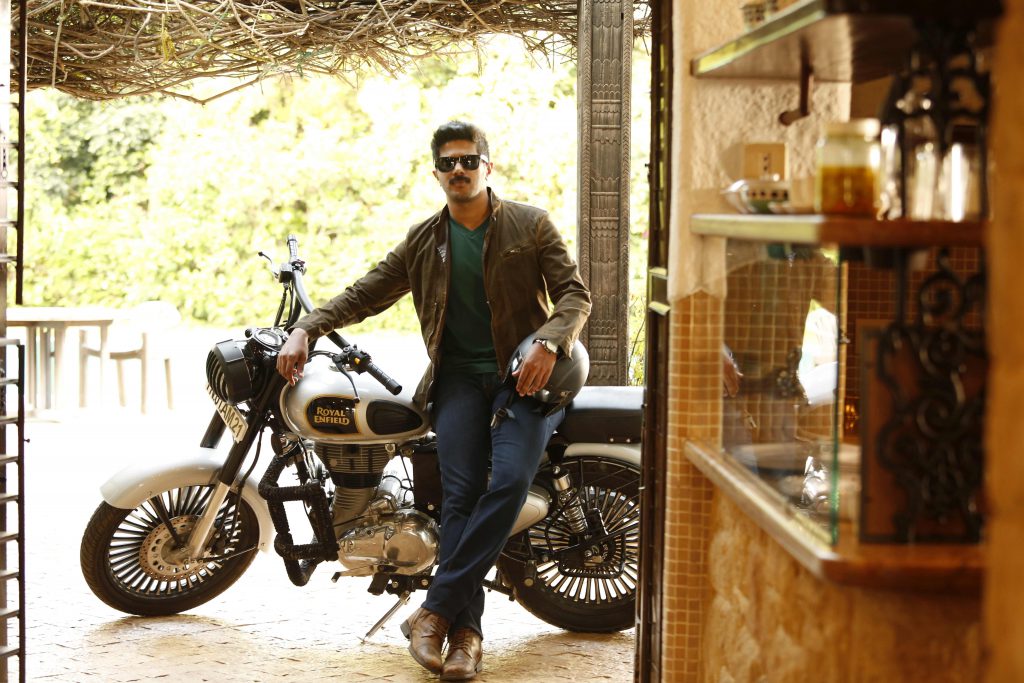It’s a huge risk to dabble with anthologies, and Bejoy Nambiar takes on the task with immense ambition. But as a collective, ‘Solo’ runs with sparsely solid segments, that scores a point for its structure and format, but falls short of filling it up with germane and gripping substance.
Some schemes that go amiss defy explanations and ‘Solo’ is one such, with an elaborate design of things, an intricate structure and a flamboyant cast, all of which are misspent. Bejoy Nambiar’s ensemble piece ‘Solo’ is one that sadly lacks a soul, and runs rampant for two hours and thirty minutes that could actually boast of very few moments that truly hold up.
Nambiar draws on the Shaivite mythology and merges it up exotically with the four elements – Water, Wind, Fire and Earth – and sketches out four stories wherein the protagonists are named as Shekhar, Trilok, Shiva and Rudra, all variants of the God’s name. The baroque strategy set in all earnestness, Nambiar sets out to narrate their tales, two of which just about manage to make through without much of a dent, while the two others get noticed for all the wrong reasons.
‘Solo’ has a real stuttering start, and its four years back, when the World of Shekhar of long-locks fame is altered beyond recognition when the blind damsel Radhika (Dhansika) confesses that she has been hopelessly in love with him for long. The couple decides to tie the knot despite the initial objection of their families, and when Radhika gets pregnant the doctor announces that she has further bad news in store.
Trilok and his world are crushed to bits, when his pregnant wife Ayesha (Arthi Venkatesh) loses her life in a hit-and-run accident. The driver (Renji Panicker) coerces his son-in-law Justin (Anson Paul) to abandon the girl on the road and save their sorry selves. Four years have since passed by, and Justin and his wife Annie (Ann Augustine) now have something to fervently thank Trilok for.
Shiva, having watched his mother (Asha Jayaram) walk away from a ruinous marriage, has grown up into a vicious henchman who has apparently lost his smile and the facility to speak. Finding his dad murdered in a bar, Shiva heads over to Mumbai and takes on a dreaded don Vishnu (Prakash Belawadi) with tragic consequences.
The army training seems to have done Rudra little good, and unable to restrain himself, he barges into his girlfriend Akshara’s (Neha Sharma) house and creates a ruckus, roughing up a man who had asked for her hand in marriage. Four years hence on, he receives her wedding invitation and decides to drop by to find out once and for all, why she had ditched him in the first place.
Each of the stories, as if to accentuate the element that underlies them starts off with a portentous shot – the rain lashing on feverishly as Shekhar rams his bike against a truck, the breeze rustling against Ayesha’s legs as she cycles her way down a winding hill station road, the fire ravenously eating away a family snap as Shiva, his brother and their bitter dad stare on, and the earth that blows up against Rudra’s chest as the man sprints ahead through his strenuous training sessions. Beyond the preliminary sign though, it’s tricky to unearth further traits of the elements in each of these stories, which is why it strikes you more as a pattern ploy than anything else.
None of the tales in ‘Solo’ perhaps has that redeeming quality that keeps you glued, and while disability renders Shekhar and Radhika’s tale a vulnerable tone, the dramatics that follow ruins it all. Trilok’s tale has a high voltage climax that strikes you as adequate even if it does not leave you slack-jawed, and Shiva’s tale is salvaged to a great extent by a Sati (Sai Tamhankar), who walks in at the right moment. The finale in Rudra’s tale, is less of a climax and more of a cinematic descent; one that is determined to come up with the mother of all twists and ends up with an awkward sounding squeak instead.
Coincidences rule the roost in ‘Solo’, but then that that’s probably how unpredictable life could get. When Rudra flops down on a chair opposite his dad (Nasar) as the film almost draws to a close and asks a question that gets a rapid retort from the latter, ‘Solo’ asserts that no further questions need to be asked. You gape on, not sure whether to join in with the guffaws around you, or to commiserate and bemoan the frittering away of such abundant resources and talent.
Of the female leads, Dhansika and Neha Sharma robustly struggle through and make it to the finishing line, despite their dubbing letting them down on multiple points. Arthi Venkatesh in a miniscule role barely leaves a fixed impression, while Sruthi Hariharan blows her horn way over the top. There are a few other actors who however do make their presence felt – Anson Paul in a remorseful avatar, a charming Ann Augustine as his wife, oblivious of the trauma that her husband has been through, Sai Tamhankar in a brief emotive role that makes the World of Shiva special, Rohan Manoj as Siddhu – Shiva’s younger brother – and Asha Jayaram as their distressed mother.
You get to watch the best of Dulquer Salman as he plays Trilok, the veterinary doc who cannily saves a life or a distraught and yet so evidently baffled Shiva who finds a familiar face at the enemy’s gates. Rudra is more of a mixed bag and carries in several shades of other roles that the actor has essayed on screen, while Shekhar makes the going rough for Dulquer, and with the simulated stammer, the susceptibility of the character is totally lost on the viewers.
The picture perfect visuals that ‘Solo’ abounds with are courtesy cinematographers Girish Gangadharan, Madhu Neelakandan and Sejal Shah at their very best. On more than a few occasions, this abundance is startlingly off-putting, when they merely flash across the screen as gorgeous frames that fritter away the time, and which neither serve to carry the tales any further nor make pictorial statements of any sort.
It’s a huge risk to dabble with anthologies, and Bejoy Nambiar takes on the task with immense ambition. But as a collective, ‘Solo’ runs with sparsely solid segments that score a point for the structure and format, but falls short of filling them up with germane and gripping substance.
Verdict: Disappointing




